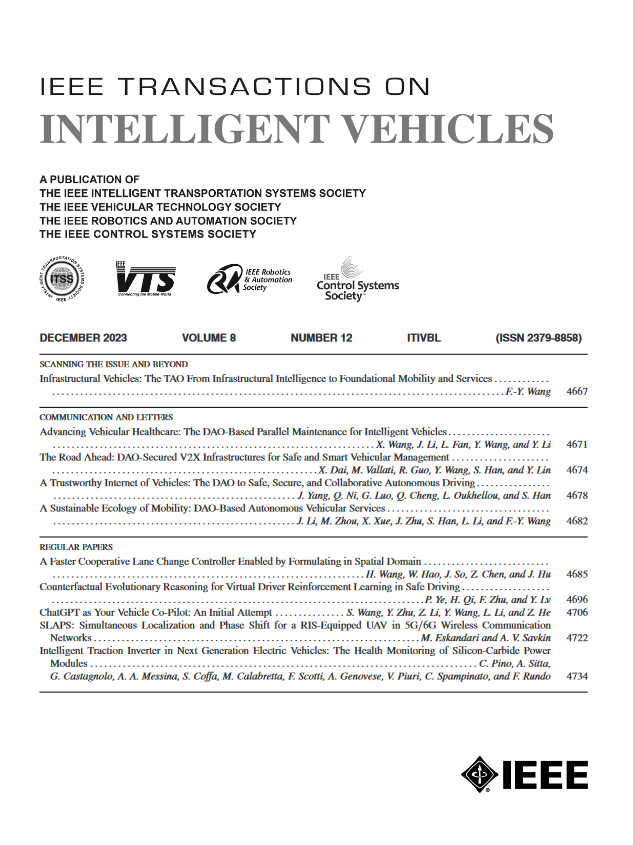基于代理基础模型的智能交通:实现交互式协作智能汽车
IF 14.3
1区 工程技术
Q1 COMPUTER SCIENCE, ARTIFICIAL INTELLIGENCE
引用次数: 0
摘要
这封信报告了在基础/基础设施智能(FII)分布式/分散式混合研讨会上获得的见解,我们在会上讨论了基础模型在智能车辆领域不断发展的作用。这些在多模态数据上预先训练好的模型利用其高级推理能力,在智能汽车领域发挥着举足轻重的作用。目前的研究重点是利用这些模型进一步改进场景感知和决策,旨在开发用于机器人导航和自动驾驶的自适应系统。然而,对于跨越网络-物理-社会空间的智能移动来说,基础智能应该学习人类层面的知识,以便根据人类的反馈执行复杂的交互和协作。作为新的训练范式,基于代理的基础模型可以生成与感知信息一致的跨领域行动,为实现交互式协作代理铺平道路。这封信讨论了如何增强和利用预训练基础模型的场景理解和空间推理能力来实现智能移动所面临的挑战。此外,它还深入探讨了在增强机器人、环境和人类之间的多模态交互中如何体现基础和基础设施智能的应用。本文章由计算机程序翻译,如有差异,请以英文原文为准。
Smart Mobility With Agent-Based Foundation Models: Towards Interactive and Collaborative Intelligent Vehicles
This letter reports the insights gained during a Distributed/Decentralized Hybrid Workshop on Foundation/Infrastructure Intelligence (FII), where we discussed the evolving role of Foundation Models in the field of intelligent vehicles. These models, pre-trained on multimodal data, have emerged as pivotal in the landscape of intelligent vehicles by leveraging their capabilities for high-level reasoning. Ongoing research focuses on these models to further improve scene perception and decision-making, aiming to develop adaptive systems for robot navigation and autonomous driving. However, for smart mobility across the Cyber-Physical-Social space, foundation intelligence should learn human-level knowledge to perform sophisticated interactions and collaborations based on human feedback. Agent-based Foundation Models, as the new training paradigm, can generate cross-domain actions consistent with perception information, paving the way to realize interactive and collaborative agents. This letter discusses the challenges of enhancing and leveraging the scene understanding and spatial reasoning capabilities of the pre-trained foundation model for smart mobility. It also offers insights into the embodied employment of foundation and infrastructure intelligence in enhancing multimodal interactions between robots, environments, and humans.
求助全文
通过发布文献求助,成功后即可免费获取论文全文。
去求助
来源期刊

IEEE Transactions on Intelligent Vehicles
Mathematics-Control and Optimization
CiteScore
12.10
自引率
13.40%
发文量
177
期刊介绍:
The IEEE Transactions on Intelligent Vehicles (T-IV) is a premier platform for publishing peer-reviewed articles that present innovative research concepts, application results, significant theoretical findings, and application case studies in the field of intelligent vehicles. With a particular emphasis on automated vehicles within roadway environments, T-IV aims to raise awareness of pressing research and application challenges.
Our focus is on providing critical information to the intelligent vehicle community, serving as a dissemination vehicle for IEEE ITS Society members and others interested in learning about the state-of-the-art developments and progress in research and applications related to intelligent vehicles. Join us in advancing knowledge and innovation in this dynamic field.
 求助内容:
求助内容: 应助结果提醒方式:
应助结果提醒方式:


